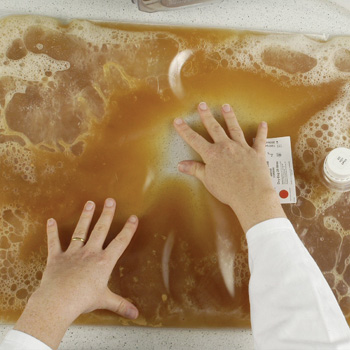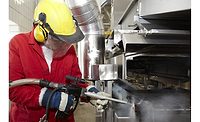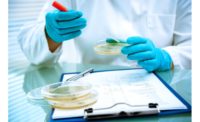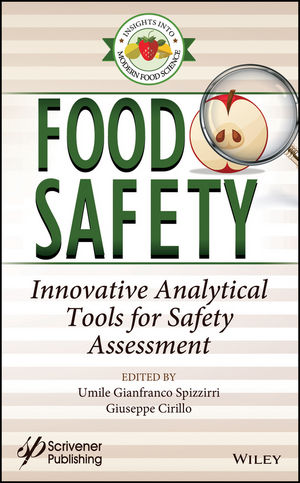Poultry Breeder Improves Environmental Monitoring with Innovative Dry-Bags

As the world’s leading supplier of broiler breeding stock, product quality is a major concern for Cobb-Vantress. The Laboratory Services Department performs a variety of routine microbiological tests to ensure the prime condition and health of flocks. Microbiology Laboratory Manager at the company’s main laboratory in Siloam Springs, Arkansas, Robin Jarquin, explains how recent laboratory changes have helped in the inoculation of environmental samples.
“Cobb-Vantress is a primary poultry breeding company, with locations in more than 20 countries around the world,” Jarquin explains. “Our products are used in almost every country with a significant poultry industry. We have over 60% market share in the U.S. and a strong presence in other markets such as U.K., Asia, South America and Australia.
“As the world’s leading supplier of broiler chickens, the health and welfare of our genetic stock is crucial to our business,” he explains. “It is in this area that the Laboratory Services Department plays a crucial role. We perform a variety of routine tests in all of our flocks in order to guarantee the disease-free status of our product. This allows us to export broiler stock to many countries and to keep a high quality product in the market.”
Environmental monitoring in the buildings where the birds are housed and processed is an important element of the company’s overall quality assurance program. Large numbers of environmental samples are inoculated into buffered peptone water as a preenrichment step. In the past, bulk quantities of buffered peptone water were prepared manually, which was labor-intensive and time-consuming. Now, however, the laboratory has adopted the Oxoid Dry-Bag format, supplied by Remel Inc.
The Dry-Bags are lightweight, transparent plastic bags containing pre-weighed, sterile dehydrated media. All that is required is the addition of water and the medium or diluent is ready for use.
The Dry-Bags also eliminate the need for glassware, which reduces hazards in the laboratory and removes the need for washing and sterilization. Water is simply added through a special filter and the bag is ready to use in just minutes. Each bag makes 20 liters of medium or diluent, sufficient for 88 aliquots of 225 mL, which can be dispensed easily through the outlet tube. Once empty, the bag can be disposed of with normal laboratory waste.
Easy-to-Use Dry-Bags Promote Good Work Flow
“Before we started using Oxoid Dry-Bags, we used to spend a significant amount of time in autoclaving, preparing and dispensing buffered peptone,” Jarquin comments. “We had to make some adjustments to the way we worked in order to change to the Dry-Bag format, but they were definitely worthwhile.
“One of the things we did to make the system work was to install an instant water heater so we could pre-warm the deionized water to 42ºC before we fill the bag and dispense the product,” continues Jarquin. “We also obtained several sets of quick connect/disconnect tubing in order to change tubing quickly as necessary.
He adds, “All this, put together with a good peristaltic pump and hand dispenser, made our process of inoculating environmental samples significantly faster and more accurate. It has also helped to improve the process aseptically.”
He notes that the system is easy to use once you have all the components in place. “You get a good work flow,” Jarquin continues. “It takes a little bit of time to introduce people to the system but, once they have used it, I don't think they want to go back to manual preparation and dispensing of buffered peptone water.”
The Oxoid Dry-Bags are available, as standard and custom, for a wide range of enrichment media and diluents.
“I see a lot of future use of the Dry-Bag format at Cobb-Vantress,” Jarquin concludes, “particularly in media such as tetrationate broth, or other broths that require routine dispensing in large volumes.”
Oxoid Dry-Bags are supplied in compact boxes of 10 bags, which are lightweight and easy to transport, providing ultimate convenience in the laboratory but taking up much less space than fully-prepared media products or media preparation facilities.
Remel, part of Thermo Fisher Scientific, is a global provider of a wide range of high quality microbiology products used by industrial, clinical, research, and academic laboratories.
Remel is a world leader in the manufacture and distribution of dehydrated and prepared culture media, collection and transport systems, diagnostic and rapid direct specimen tests, quality control products, and much more.
From sample collection to identification, Remel provides an extensive range of microbiology products. Using its vast experience, Remel employs leading-edge technology, stringent quality control measures, and premium ingredients to provide you with the highest quality microbiology products available. Every product is supported by an expert technical service staff that can answer your specific questions.
www.remel.com
Looking for a reprint of this article?
From high-res PDFs to custom plaques, order your copy today!







